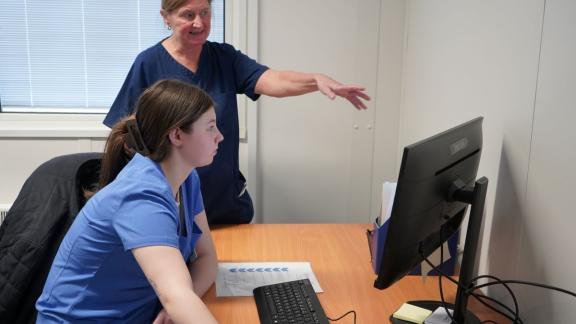Community T Level industry placements open up NHS career pathways

Overview
In 2022, North Tees and Hartlepool NHS Foundation Trust was approached by three local education providers with the idea of hosting T Level placements. The organisation didn’t have any experience with this type of placement but saw that it could encourage young talent and help develop the next generation of NHS staff.
Key benefits and outcomes
- Exposure to a range of health professions helps students make informed career choices.
- Hands-on placements in community settings build practical skills and understanding of multidisciplinary care.
- Collaborations with education providers have led to shared resources, infrastructure funding and joint career exploration activities.
- Students bring fresh perspectives that contribute to shaping future healthcare services and ways of working.
What the organisation faced
Pilot placements had already shown the benefits of supporting T Level students. However, the number of placements needed exceeded the number of placements available in acute wards, so the placements were expanded to include community settings. Senior allied health professionals and nurses approved the roles for T Level students, which were then risk assessed. This meant staff knew that students understood what was expected of them, but it also meant that they understood their own role in the placements. A senior nurse commented:
With approval from senior staff, we conducted risk assessments and clearly defined the roles and boundaries for students. This ensures that staff are confident in providing support and that students understand their limits.”
Emma Davies, Education Lead, North Tees and Hartlepool NHS Foundation Trust
What the organisation did
Allied health professionals and nursing staff from the healthy lives care group supervised T Level students to assist practitioners in their clinical practice and learn about community services. The placements were designed to give students the tools they need to make informed decisions about joining the NHS once they had completed their training.
T Level students are offered up to two placements in the trust, rotating between hospital departments and community placements, all of which are supervised by allied health professionals and/or nurses. For community placements, students work from a variety of bases, and they visit patients in their homes, care homes and other settings. They observe and help practitioners treat patients that have been referred to a service by GPs, consultants, practice nurses or physiotherapists.
T Level health students study physiology, pathophysiology, communication, teamwork and person-centred care as part of their course. This means they already have skills they can use. For example, in the community respiratory service, they assist practitioners with initial assessments, oxygen assessments, diagnostics and rehabilitation classes. They provide valuable reassurance to patients by spending time with them, aiding in therapy to support people to improve their health and maintain daily living skills. They also work with therapist teams to promote patient exercises and activities that enhance overall fitness, such as musculoskeletal or respiratory health.
Results and benefits
Placements in the community, such as with the healthy lives care group, give students the opportunity to provide care under the supervision of a range of health professionals. This includes nursing but also the allied health profession careers, such as physiotherapy, speech and language therapy and podiatry. It is this variety that supports students in making informed career decisions and supports the aims of the NHS Long Term Workforce Plan.
Alongside creating a sustainable workforce, the placements introduce students to ways of working they would otherwise not experience. This will help shape the services of the future.
“As we work hard to shift services from hospital to communities and introduce innovative models of care like Hospital at Home, it is vital we have a workforce that wants to work differently. Delivering care at home is incredibly rewarding but also challenging. It is great to have T Level students learning from our brilliant teams, from nurses to allied health professionals and our wonderful support workforce. There certainly is a career for all in community services.”
Jill Foreman, Head of Hospital Services, North Tees and Hartlepool NHS Foundation Trust
Through the placements, the trust has formed mutually beneficial partnerships with the three education providers, which has included funding contributions for infrastructure that supports learners. Joint career exploration activities also help T Level students identify available career paths and further training opportunities.
Integrating T Level placements into various healthcare settings has been beneficial for all involved. Hands-on community placements with clearly defined roles enhance students’ skills and knowledge but they also enable healthcare teams to do more. Providing experiences of different health professions gives T Level students the tools to make informed decisions about their future careers in healthcare. Just as building strong partnerships with educational institutions supports the development of a sustainable and well-prepared future workforce.
Key takeaways
- Encouraging T Level students to pursue careers in healthcare is part of national policy on workforce development and contributes to developing a sustainable future workforce.
- Placements in the community and with multidisciplinary teams give T Level students a broader experience, so they can make informed decisions about their career choices.
- Risk assessments and clearly defined roles and boundaries for students give staff confidence in the support they provide and help students understand expectations.
- Joint working with colleges on initiatives like career exploration activities helps students identify career paths and further training opportunities that encourage them to enter the healthcare sector.
For more information, contact Emma Davies, education lead.



